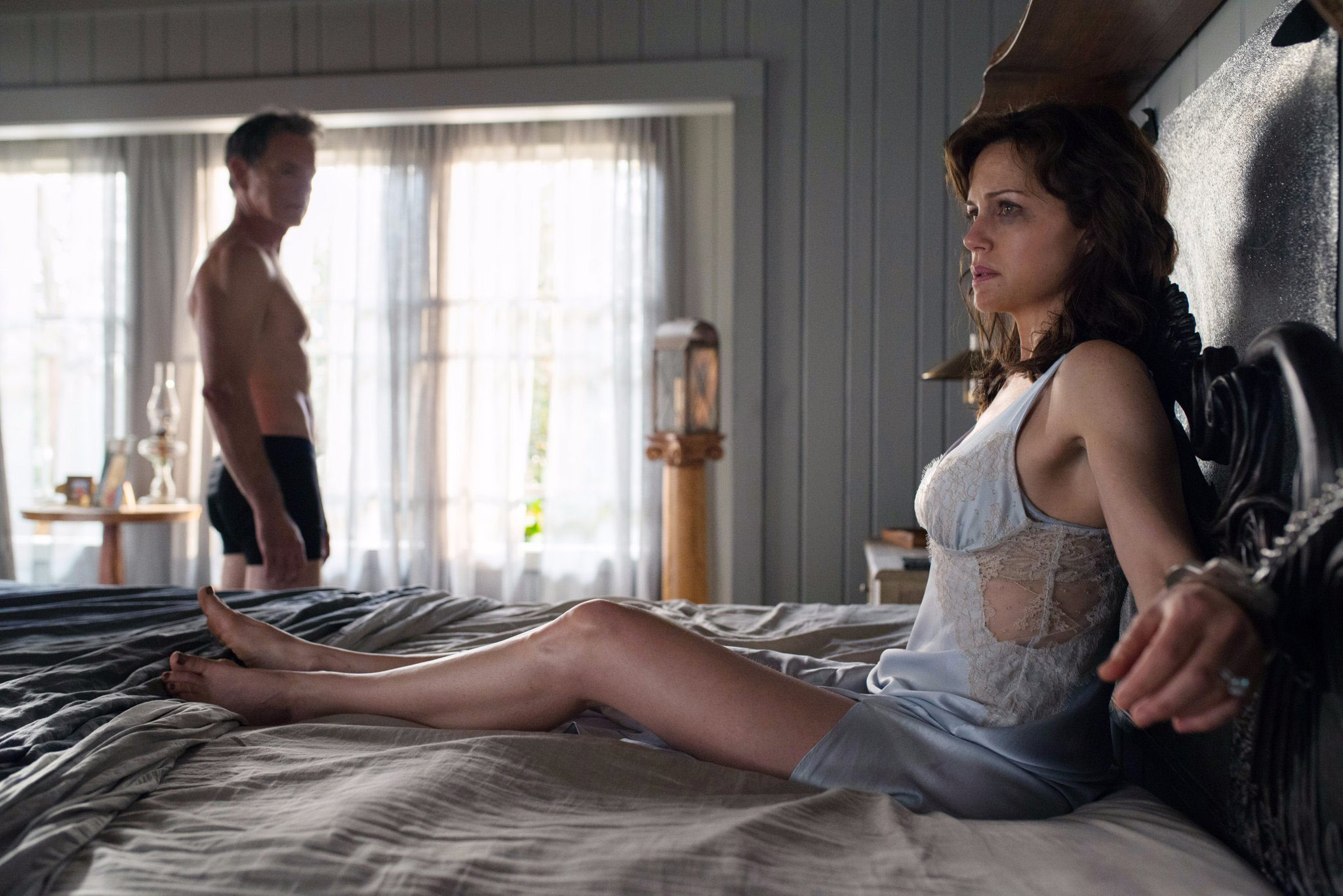
Credit:@carlagugino
By Madison Whatley
When the romantic getaway of a strained couple becomes malicious, Carla Gugino as Jessie Burlingame is forced to mentally confront the vestiges of her repressed childhood trauma to survive the events caused by her husband, Gerald’s (Bruce Greenwood) disturbing fantasies in the Netflix original thriller, “Gerald’s Game.” “Gerald’s Game “ is an adaptation of the Stephen King novel by the same name, released Sep. 29. This suspenseful, feminist film is undoubtedly worth watching for viewers that can persevere through many unsettling scenes.
Most of the film takes place in a small bedroom in a vacation home by the shore, and with Gerald’s early removal, the film’s limited setting and characters allow viewers to focus solely on the development of Jessie. Because she is rendered stationary throughout her predicament, the plot is mostly mental. Viewers learn about Jessie through her dreams depicting abuse that she received as a child as well as her hallucinations of herself and her husband representing the tension between her gutsy spirit and the meek persona that she had taken on in response to her traumatic experiences. Between the looming presence of her husband’s rotting corpse, a starving, bloodthirsty dog, and an ominous man with a collection of bones and the threat of death by starvation and dehydration, Jessie is under high stress. It is easy to understand how these dark circumstances have drudged up tough memories for her. Her trauma is a mental block that could condemn her to death.
In the opening scene, the couple packs their bags as Sam Cooke’s “Bring It on Home to Me” (1962) plays in the background. The scene shifts to the couple in the car on the way to the vacation home and Gerald is playing the song in the car until Jessie shuts it off to “enjoy nature.” The song is sweet and upbeat, fit for an exciting occasion. However, closer inspection of the lyrics reveals a more sinister tone that foreshadows the dark turn that is about to take place in the film: “You know I’ll always be your slave/ ‘Till I’m buried, buried in my grave.” Once Jessie is in the room, there is no music. The audience feels Jessie’s anxiety and understands the helplessness of her situation. The audience only hears what she can: the sounds of the room. The only time that music comes up again is when Jessie recalls a specific instance of abuse against her as a child. Her father puts an oldies station on the radio, and during a pivotal moment, “Bring It on Home to Me” begins to play. This choice by the filmmaker shows the parallel between Jessie’s husband and her father.
Jessie’s uncovering of a long-forgotten piece of her past is what ultimately reveals to her a grizzly means of escaping the bedroom. The imagery of the solar eclipse in the film is symbolic of the overlap between her past and present. By surviving the ordeal, she brings herself “out of the darkness,” but not without lingering repercussions. While it would be unrealistic to show a complete recovery from the abuse, the resolution instead portrays female empowerment as a journey of resilience. Jessie is finally able to exercise her potential and work towards her fulfillment.
It is especially refreshing to see feminism in a genre that is known for its objectification and weak characterizations of women. Although Jessie is the typical passive female victim at the beginning of the story, in a deviation from the norm, she becomes a hero for herself.
Director and co-writer Mike Flanagan is certainly earning his stripes in the horror genre. With recent 2016 works Hush and Ouija: Origin of Evil in addition to Gerald’s Game as his most recent release, he is becoming known for creating suspense with vulnerable characters and confined spaces and executing it exceptionally well. Fans can look forward to his upcoming projects: a remake of I Know What You Did Last Summer (1997) and a Netflix original TV series The Haunting of Hill House based on the novel by Shirley Jackson.
Gerald’s Game is a sophisticated and honest survival story that adds depth to the typically cookie-cutter genre of horror, but it is not suitable for younger or more squeamish audiences. For its originality and oddly uplifting mood:
Movie Review Score: 4.5 out of 5 Paws





